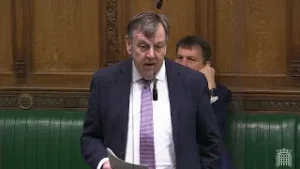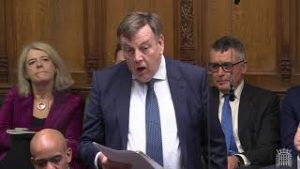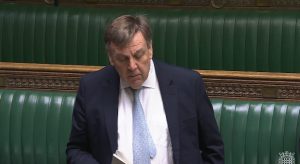Ed Miliband The Secretary of State for Energy Security and Net Zero
With permission, I would like to make a statement about Government plans for investment in new nuclear power.
Sixteen years ago, in 2009, as Energy Secretary I delivered a statement to this House identifying potential sites for new nuclear. I said:
“We need to use all available low-carbon sources… New nuclear is right for energy security and climate change, and it will be good for jobs too”.—[Official Report, 9 November 2009;
Vol. 499, c. 31.]
That was true back then, and it is even more true today. Russia’s invasion of Ukraine and the cost of living crisis that followed showed how vulnerable we are as a country because of our dependence on fossil fuels, at the whim of markets controlled by petrostates and dictators. The imperative of energy security and the demands of the climate crisis mean that we must shift as fast as possible to clean, home-grown power. The demand for that power, as we shift away from gas, is expected to at least double by 2050, so we need all the low-carbon sources possible to meet the demands we face.
The advice from experts, including the Climate Change Committee, is clear: we need new nuclear to meet our climate obligations. This Government support new nuclear because of our belief that the climate crisis is the greatest long-term threat facing our country and our world, not in spite of it; because of the imperative of energy security; and because of the good, skilled jobs that nuclear provides. In Britain today, there are too few industries that offer the secure, well-paid jobs with strong trade unions that the British people desire and deserve. Time and again, I have heard from people up and down the country about the importance of nuclear jobs to their communities. For all these reasons, the Government are taking decisive steps today to usher in a new golden age of nuclear for Britain.
First, back in the late 2000s, when I was Energy Secretary, I identified Sizewell as a potential site for new nuclear. It has taken 16 years, but I am incredibly proud that today we are announcing £14.2 billion of public funding for this spending review period to build Sizewell C, the first Government-funded and owned nuclear power station in Britain since the 1980s—a strategic partnership with France, with EDF intending to invest alongside us.
I recognise the contribution of my hon. Friends the Members for Lowestoft (Jess Asato) and for Ipswich (Jack Abbott) in advocating for this project and my hon. Friend Charlotte Nichols for her advocacy for nuclear as a whole. I also acknowledge the work of Andrew Bowie, who is not in his place, when he was Minister for nuclear.
Sizewell C will power the equivalent of around 6 million homes with clean, home-grown energy for 60 years, and will be a jobs and growth engine for Britain, supporting 10,000 jobs at peak construction and creating 1,500 apprenticeships—well-paid, highly skilled jobs in East Anglia and communities across the country. I thank the GMB, Unite, and Prospect trade unions, which are brilliant champions for the nuclear industry. Sizewell has already signed £4.2 billion-worth of contracts with 311 companies, and will eventually work with 3,500 suppliers in all four nations of the UK.
This project is good value for money for the taxpayer, because there will be a clear economic return on the investment, and for the bill payer, because all the due diligence we have done demonstrates that the cost of the clean power it will supply will be cheaper than the alternative. We expect the final investment decision on the project, including through the capital raise from the private sector, to be completed in the summer, when we will set out further detail. This is a new generation of nuclear power, promised for years and delivered by this Labour Government.
Secondly, small modular reactors offer a huge industrial opportunity for our country, and we are determined to harness Britain’s nuclear expertise to win the global race to lead in this new technology. I can inform the House that following a rigorous two-year competition, today Rolls-Royce SMR has been selected as the preferred bidder to develop the UK’s first SMRs, subject to final Government approvals and contract signature. This initial project could create up to 3,000 skilled jobs and power the equivalent of around 3 million homes.
In the spending review, we are committing to the public investment needed to get the SMR programme off the ground, with more than £2.5 billion in funding over the period. The project will be delivered by Great British Energy Nuclear, a publicly owned company headquartered in Warrington—an allied company to Great British Energy, which is headquartered in Aberdeen. Subject to Government approvals, the contracts will be signed later this year. Our aim is to deliver one of Europe’s first SMR fleets, leading the world in the nuclear technologies of the future, with more good jobs and energy security funded and made possible by this Labour Government.
Thirdly, beyond the immediate horizon, nuclear fusion offers the potential of an energy-abundant future. Britain already leads, thanks to the pioneering work of the UK Atomic Energy Authority, but unlike in the past, we are determined to make the investments to stay ahead as a country. Today, we are pledging to invest more than £2.5 billion in nuclear fusion, including in the STEP—spherical tokamak for energy production—programme, which will help to progress the new prototype fusion plant at West Burton. I congratulate the Mayor of the East Midlands, Claire Ward, on her tireless advocacy for this project, as well as my hon. Friends the Members for Bassetlaw (Jo White) and for Rushcliffe (James Naish) on their advocacy. This will be the first fusion plant of its kind in the world, and it will be on the site of a former coal-fired power station. Under a Labour Government, Britain will lead the clean energy transition and trailblaze the technologies of the future.
Fourthly, our nuclear ambitions do not stop there. As we move ahead on these projects, we see huge potential right across the country. That is why we are looking to provide a route for private sector-led advanced nuclear projects—advanced modular reactors and SMRs—to be deployed in the UK. And we will task Great British Energy Nuclear with a new role in assessing proposals, with the National Wealth Fund exploring potential investment opportunities. My message to the private sector is that if it wants to build new nuclear, Britain is open for business.
I can also tell the House that, following the incredible campaigning work of my hon. Friends the Members for Whitehaven and Workington (Josh MacAlister), for Carlisle (Ms Minns), for Penrith and Solway (Markus Campbell-Savours) and for Barrow and Furness (Michelle Scrogham), my Department has asked the Nuclear Decommissioning Authority and Cumberland council to consider the potential of privately led clean energy development in Moorside, delivering jobs and growth in Cumbria.
We also know that this is an industry that demands long-term thinking. Therefore, having announced these steps today, we will build on our 2030 clean power action plan and set out our plans for the energy system, including our ambitions and next steps on nuclear, into the 2030s and beyond.
Taken together, the steps that I have announced today will kick off the biggest nuclear building programme that Britain has seen in half a century, doubling down on our nuclear strength to take the latest step forward in our mission to make Britain a clean energy superpower. When people ask what clean energy and net zero means for our country, this is what it is all about. For too long, our country has not made the crucial investments in energy or infrastructure that we need. The British people have paid the price for this short-sighted failure to invest—in lower living standards, insecurity and declining public services. This week’s announcements signal a decisive change in approach—to invest in the future and make the right choice for energy security, the right choice for jobs, the right choice for climate, our children and grandchildren, the right choice for Britain, and the right choice of investment over decline. I commend this statement to the House.
Lindsay Hoyle Speaker of the House of Commons
I call the shadow Minister.
Nick Timothy Opposition Assistant Whip (Commons)
I thank the Secretary of State for advance sight of his statement.
The Conservative party is a pro-nuclear party and we welcome any decisions, backed by investment, that increase Britain’s nuclear capacity, because we cannot deliver cheap, reliable and secure energy without it. Although the investment announced today by the Secretary of State is significant, it is a fraction of the £230 billion cost, which will ultimately be borne by consumers, of his plan to decarbonise the grid. Unlike the intermittent technologies backed at such cost by the Secretary of State, nuclear provides reliable baseload power. It generates inertia to stabilise our grid. Nuclear power plants require substantially less new grid infrastructure compared with dispersed generation from wind and solar. It is to the shame of successive Governments over many years that Britain relinquished its status as a world leader in civil nuclear technologies. In 1965, we had more nuclear reactors than the United States, the USSR and the rest of the world put together. Between 1956 and 1966, we built 10 nuclear power stations, but we gave all that up. The contribution of nuclear to our power generation peaked in 1994 and has fallen consistently since then.
Labour came to power in 1997, saying that it saw no economic case for the building of any new nuclear power stations. In 2010, the coalition agreement ruled out public investment in nuclear. It was the last Conservative Government who planned the largest revival of nuclear power in 70 years and it is thanks to that work that the Secretary of State has been able to make many of these announcements today. Can he reiterate, despite the headlines this morning, that the final investment decision has not yet been made? He said in his statement that he will announce it in the summer, but can he give us a more precise date when we will be told the total Government investment and the private capital raised?
This statement is a downgrade on what the previous Government put in motion. Today, the Energy Secretary has announced only one small modular reactor. There is no clear target to increase nuclear power generation and no news on Wylfa. The nuclear industry is expecting news of a third gigawatt scale reactor. The previous Government purchased the land and committed to build, but on this today the Energy Secretary said nothing. Can he commit to the planning inherited for a third gigawatt scale plant at Wylfa and will he recommit to the Conservative policy of 24 GW of nuclear power by 2050?
Although it is good news that Rolls-Royce will build our first small modular reactors, this is a downgrade on what was previously planned. Can the Secretary of State tell us why he has awarded just one technology rather than two as set out previously? Furthermore, will he commit, as other countries have, to going faster?
Canada has approved a plan for four SMRs by 2029. As things stand, Britain will not have SMRs connected to the grid until the 2030s. The contrast between this caution on nuclear and the Government’s rush to decarbonise the entire grid in just five years, while betting the house on unreliable and intermittent renewable technologies and shutting down British oil and gas in the North sea, could not be clearer. We need the Energy Secretary to focus on the positive, not to stake our country’s future and people’s bills on ideology.
Ed Miliband The Secretary of State for Energy Security and Net Zero
I feel a bit sorry for the hon. Gentleman; it is hard on a day like this to be an Opposition Member. Nevertheless, I will try to answer his questions, such as they are. On the question about the final investment decision, he will be aware that we are currently doing the private sector capital raise. When that is complete, we will proceed to the final investment decision, which will take place this summer. That is obviously important.
On his fundamental question, I do slightly scratch my head, because he says that this is a downgrade—we have announced the largest nuclear building programme in 50 years! What he says might have looked good in the mirror this morning, but it does not bear much resemblance to reality. The question, which goes to the point I made at the end of my statement, is this: why did the Conservatives make all these promises on nuclear but fail to deliver them? There is a simple answer. It was not because of a lack of diligence from his colleague Andrew Bowie. The simple reason is that they did not put up the money. They did not make the investment. The one thing that has bedevilled the nuclear programme is a failure to invest public money.
In this spending review we are putting in £14 billion for Sizewell, £2.5 billion for SMRs, and £2.5 billion for fusion. Those are significant sums of long-term capital investment. The Conservatives made all these promises, but they did not put in the money. I was the guy who identified Sizewell, and I am back here delivering Sizewell. This Government are willing to make the investment. We welcome the support from Nick Timothy, such as it is, but he needs to learn some lessons. Public investment, not decline, is the answer for Britain.
John Whittingdale Conservative, Maldon
The Secretary of State will be aware that it was originally proposed to build a third nuclear power station, based on a Chinese design, at Bradwell-on-Sea in my constituency. Is a third station—it will not be Chinese—at Bradwell still a possibility, or could it be allocated an SMR?
Ed Miliband The Secretary of State for Energy Security and Net Zero
Good nuclear sites, including Bradwell, are always going to be possibilities as far as I am concerned. We are not going to have China building our nuclear power stations, but if the right hon. Gentleman wants to discuss this with my Department, we will be happy to do so.


